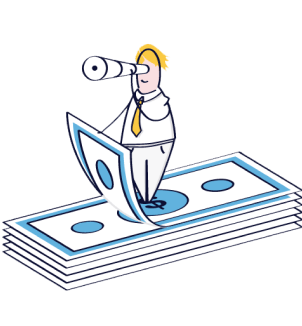
If you’ve been using “pipeline” and “funnel” to mean the same thing, you might want to pay attention.
Sales pipeline and sales funnel both describe the flow of prospects through a sale, but there’s an important difference between the two commonly confused terms. While the definition and meaning of a sales pipeline versus that of a sales funnel may seem similar, there are some fundamental differences.
A sales pipeline is a set of stages that a prospect moves through, as they progress from a new lead to a customer. Once each pipeline stage is completed, the prospect is advanced to the next stage.
Though the structure can differ from company to company when building a sales pipeline, here are some of the more common stages:
Transform your sales process with our comprehensive sales pipeline training guide. From filling your pipeline to pipeline management, learn it all.

Now, here’s where things start to get confusing…
1) A sales pipeline is similar—but not identical—to a sales process, which refers to the recurring actions that a team takes on every lead to move them across those stages (i.e., distributing leads to the proper team member, calling new leads to qualify them, or doing research in advance of a presentation). The actions in a sales process are divided into pipeline stages.
2) Many sales professionals use “pipeline” or “sales pipeline” to mean the quantity or dollar value of the deals currently in their pipeline, not the series of sales stages themselves. It’s very common to hear a sales rep lament that their “pipeline is looking rough” because they let their prospecting efforts fall by the wayside, or to hear a manager call a “pipeline meeting” to discuss the specific deals that the team has in progress.
What they’re really talking about is pipeline value, which is measured by a pipeline report.
A pipeline report shows the value and quantity of all deals in each stage of the pipeline at the moment when the report is run.

Related: The sales pipeline prescription: how to cure the 10 most common ailments plaguing your pipeline
Pipeline reports help sellers keep track of the status of every deal and understand whether they have an appropriate distribution of deals in order to meet their sales targets.
While Nutshell uses the “series of stages” definition when referring to “sales pipelines” in our CRM, don’t be thrown off when you hear seasoned sales pros use it to mean “value of deals in progress.” As a wise band once sang, sometimes words have two meanings…
Hate your current CRM? Still working off spreadsheets? Register for our “Intro to Nutshell” live demo and see why sales teams love us!
Unlike a sales pipeline, which focuses on the set of actions taken by sellers, a sales funnel represents the quantity and conversion rates of prospects through your pipeline stages. It’s called a “funnel” because of its shape: wide at the top as prospects enter, then increasingly narrow as they are disqualified or decide not to buy.
Unlike a pipeline report, which shows the value and quantity of deals at the moment when the report is run, a funnel report is based on a cohort. This means that a funnel report can tell you, for example, of the 100 leads you received last quarter, what percentage of them advanced through each stage of your pipeline.

A sales cycle funnel report is important for sales leaders because it can help them forecast sales and identify where deals are getting stuck. A sales funnel forecast report is generated based on current lead volume. And pinpointing bottlenecks in the funnel cycle helps them improve their process and better coach their team.
Get 70+ expert strategies for sales management success in our Sales Manager’s Survival Guide.

So when you’re thinking about the difference between a pipeline and funnel, remember this: A pipeline reflects what a seller does during the sales process, and a funnel measures conversion rates through the sales process.
To sum up:
As you’ve probably realized, the sales pipeline and sales funnel are moving in the same direction, along the buyer’s journey from discovery to close. That’s why you can – and should – use both to determine your business’s sales strategy.
The conversion rates found in the sales funnel report are a response to things that your sales team can control – sales rep actions, how they communicate, and how often they’re reaching out and working to move leads through the sales pipeline.
When analyzing conversion rates in your sales funnel, keeping your sales pipeline on hand can help you map seller actions directly to buyer conversions and find opportunities to improve your process.
Want to turn your sales pipeline into a conversion machine? Take a tour of Nutshell and learn how our CRM’s sales process tools and insights help sales reps add more qualified leads to their pipeline and win more deals.
And with our Multiple Pipelines feature, Nutshell Pro users can even configure multiple sets of stages for distinctly different sales efforts.
After exploring our robust suite of CRM features, why not try it out for yourself? Explore any Nutshell plan free for 14 days – no credit card required. Contact our team to learn more about how Nutshell can help your business create the ideal sales pipeline, whatever your sales model.
No problem. To see if Nutshell is the right choice for your sales team, start a 14-day free trial today!


Join 30,000+ other sales and marketing professionals. Subscribe to our Sell to Win newsletter!
 Email & Calendar Sync
Email & Calendar Sync
Use our calculator to add up your total investment of CRM and Add-ons
VIEW ALL PRICING
 Product Info
Product Info Education & Guides
Education & Guides Company
Company